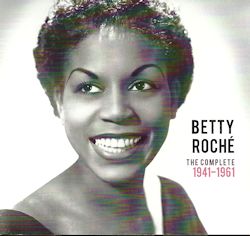CD1
1. Take The "A" Train
2. Something To Live For
3. In A Mellotone
4. Time After Time
5. Go Away Blues
6. Can't Help Lovin' Dat Man
7. Route 66
8. All My Life
9. I Just Got The Message, Baby
10. All Too Soon
11. You Don't Love Me No More
12. September In The Rain
13. Summertime
14. Come Rain Or Come Shine
15. A Foggy Day
16. Day By Day
17. When I Fall In Love
18. Blue Moon
19. Where Or When
20. September Song
21. Until The Real Thing Comes Along
22. Billie's Bounce
CD 2
1.
Someone To Watch Over Me
2. Why Shouldn't I
3. Jim
4. Polka Dots and Moonbeams
5. For All We Know
6. Rocks In My Bed
7. Just Squeeze Me
8. I Got It Bad
9. Maybe You'll Be There
10. I Had The Craziest Dream
11. 'ats In There
12. The Blues
13. Blues On My Weary Mind
14. I Love My Lovin' Lover
15. Trouble, Trouble
16. I'll Get By
17. Rainy Day Blues
18. Dirty Money Blues
19. Just Give Me A Man
20. I Love My Lovin' Lover
21. Body and Soul
22. Take The "A" Train
Collective personnel
Betty Roché - Vocals
Al Cooper's Savoy Sultans
Duke Ellington, Earl Hines, Ram Ramirez, Don Trenner, Jimmy Neeley - Piano
Rex Stewart, Harold Baker, Wallace Jones, Cappy Oliver, Clark Terry, Willie Cook, Cat Anderson, Conte Candoli - Trumpet
Tricky Sam Nanton, Juan Tizol, Lawrence Brown, Quentin Jackson, Britt Woodman - Trombone
Chauncey Haughton - Clarinet
Jimmy Hamilton - Clarinet, tenor sax
Johnny Hodges, Hilton Jefferson - Alto sax
Russell Procope - Alto sax, clarinet
Ben Webster, Flip Phillips, Jack McVea, Paul Gonsalves, Jimmy Forrest - Tenor sax
Harry Carney - Alto sax, baritone sax
Otto Hardwick- Alto sax, bass sax
Fred Guy, Al Casey, Bill Jennings, Wally Richardson - Guitar
Junior Raglin, Oscar Pettiford, Frank Clarke, Wendell Marshall, Whitey Mitchell, Michel Mulia - Bass
$onny Greer, Sid Catlett, Louie Bellson, Davey Williams, Roy Haynes, Rudy Lawless - Drums
Ray Nance - Trumpet, violin
Rabon Tarrant - Drums, vocals
Gerald Wilson and his Orchestra
Eddie Costa - Vibes
Jack McDuff - Organ
Betty Roché? You've never heard of her? Many jazz fans may not know her name, even though Betty was with the Duke Ellington Orchestra in the forties and
fifties. She sang "The Blues" in the Duke's famous suite, Black, Brown and Beige, which should have marked her out for success, but a strike by
the American Federation of Musicians prevented her from following that success with more recordings.
I first encountered Betty Roché on an EP of the Ellington band where she sang Take the "A" Train with commendable spirit. I wondered why I hadn't
heard her before, as she was such a notable vocalist, but she was destined to remain in the shadows. So I am glad to welcome this double CD which may
introduce her to new listeners.
Like Ella Fitzgerald, Betty started her singing career by winning a talent contest at the Apollo Theatre in Harlem. She performed with the Savoy Sulans and
Hot Lips Page before joining Ellington in 1943, the year she recorded The Blues. She then worked with Earl Hines and Gerald Wilson but the rest of
the forties was a comparatively blank period for her. She returned to the limelight when she rejoined Ellington in 1952. That was when she recorded the
memorable version of Take the "A" Train, which ends this double album and illustrates her new beboppish tendencies. She sings with enthusiasm and
humour, scatting and improvising with verve. The track is heightened by the orchestra's superb playing, especially a solo from tenorist Paul Gonsalves. The
track lasts for six minutes but it sounds as if it should have been longer but the remastering chopped off the end.
This track typifies Betty's strengths: her clear diction, her ability to sound serious as well as light-hearted, and the swing which she often created by
singing slightly behind the beat. Many of her performances are imbued with a feeling for the blues which is evident in such tracks as Come Rain Or Come Shine as well as the five songs with "Blues" in the title. Her singing is often enhanced by some good musicians among her
accompanists - such as tenorists Jimmy Forrest and Jack McVea, violinist Ray Nance and, of course, the whole Ellington band.
By the time we reach Betty's 1960 album, Singin' and Swingin', which is included in its entirety, her singing has become extremely adventurous.
She scats, bends notes precariously, and takes outrageous liberties, egged on by Jimmy Forrest and organist Jack McDuff. She even plays about with a song
like September Song, which is usually performed solemnly or sadly.
My only grouse about this album is that, as on the Carmen McRae album I recently reviewed, the tracks are not arranged chronologically, which conflicts
with the personnel listing which is in chronological order. Nonetheless, I am glad that Betty Roché may now be better known because of this
collection.
Tony Augarde
www.augardebooks.co.uk
